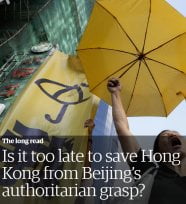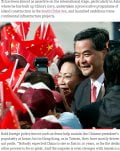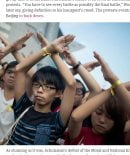The UK’s ever-cheerful Guardian asks whether Hong Kong can be saved from China’s authoritarianism. It focuses on the photogenic Joshua Wong ‘David and Goliath’ angle, which presumably appeals to the paper’s trendy/liberal target audience, but misses the bigger picture. Hong Kong youth’s rebelliousness is part of a larger ongoing conflict. Worse, the article passes on one of the more disingenuous lines pushed by Beijing and its apologists…
Yet one cannot understand the city’s present state of permanent crisis without reckoning with a simple fact: the mainland is no longer dependent on Hong Kong. In reality, the reverse may be true. The impact of this fact is not solely economic or political; it is also psychological, transforming the way mainlanders and Hong Kongers conceive of themselves.
Today, China’s economy is more than 11 times larger than it was at the time of the handover. Over that same time span, Hong Kong’s economy has been stagnant by comparison… it is this kind of psychological role-reversal that has unsettled people most.
 This is the Chinese Communist Party’s official ‘moderate’ (non-foreigner-blaming) explanation for Hong Kong’s angst. It naturally presents the CCP as infallible – successfully creating a far wealthier China, while Hong Kong people wallow in self-pity and resentment at becoming only fairly rather than vastly richer than now-proud Mainlanders. It satisfies Beijing’s logic. But it is shallow and insulting, and presumptuous in imagining that Hongkongers even care about relative GDP growth or what Mainlanders think.
This is the Chinese Communist Party’s official ‘moderate’ (non-foreigner-blaming) explanation for Hong Kong’s angst. It naturally presents the CCP as infallible – successfully creating a far wealthier China, while Hong Kong people wallow in self-pity and resentment at becoming only fairly rather than vastly richer than now-proud Mainlanders. It satisfies Beijing’s logic. But it is shallow and insulting, and presumptuous in imagining that Hongkongers even care about relative GDP growth or what Mainlanders think.
China’s development – and Hong Kong’s adaptation to it – is an important economic story. But it’s largely a sideshow here, especially when you strip out the Mainland locust-shoppers and home-buying money-launderers, whose disruptive arbitraging in the city is enabled by policy. While it is true that younger Hongkongers don’t have the upward  mobility of their parents in the 1970s or 80s, it’s because they were born in an already-mature, prosperous economy. If you leave out the unskilled Mainland immigrants who have arrived since 1997 (also a Mainlandization policy), the Joshua Wong generation are materially more blessed than any earlier demographic, housing prices notwithstanding. These youngsters don’t even remember the days when people had to take cash, food, electronics and medicine over the border to grasping families every Chinese New Year, let alone harbour some perverse nostalgia for them.
mobility of their parents in the 1970s or 80s, it’s because they were born in an already-mature, prosperous economy. If you leave out the unskilled Mainland immigrants who have arrived since 1997 (also a Mainlandization policy), the Joshua Wong generation are materially more blessed than any earlier demographic, housing prices notwithstanding. These youngsters don’t even remember the days when people had to take cash, food, electronics and medicine over the border to grasping families every Chinese New Year, let alone harbour some perverse nostalgia for them.
So what’s really happening? It’s this: a dictatorship is trying to accommodate and absorb a pluralistic society – and failing.
Since before the 1997 handover, the Chinese regime has miscalculated Hong Kong public opinion, or simply failed to grasp that it matters. The country’s much-vaunted growing power and assertiveness make it worse, if anything. Beijing’s officials have grown  increasingly nervous and frustrated at their inability to control the city’s media, courts, schools and other institutions the way they are accustomed to doing at home. For local ‘friends’, they rely on co-opted commercial and other narrow interests that are parasites on the local population and economy. Clumsy attempts to assert authority (threats of economic doom, promises of ‘opportunities’, over-reaction against dissent, National Education, sham political reform) provoke cynicism or resistance. Even thoughtful local pro-Beijing figures despair at the cycle of alienation.
increasingly nervous and frustrated at their inability to control the city’s media, courts, schools and other institutions the way they are accustomed to doing at home. For local ‘friends’, they rely on co-opted commercial and other narrow interests that are parasites on the local population and economy. Clumsy attempts to assert authority (threats of economic doom, promises of ‘opportunities’, over-reaction against dissent, National Education, sham political reform) provoke cynicism or resistance. Even thoughtful local pro-Beijing figures despair at the cycle of alienation.
This is where the young radicals deserve the spotlight: the post-1997 generation are even less impressed than their elders with Communist-run China as a source of material prosperity or as an emotional motherland. Rather than easing into the post-colonial order, they are fighting back even harder. And they clearly frighten the almighty Panda. It’s a stirring story, but it needs to be put in the full context.
Zoom out further, and you see how big this context is. Beijing is losing – has lost – Taiwan, where the younger generation luckily have a head start over Hong Kong in keeping their country safe from the Communist Party’s paranoid, psychopathic loathsomeness. And if they can’t handle Hong Kong or Taiwan, imagine how much China’s leaders struggle and fail to comprehend the wider world.


Both parties in the US, but it particular, the Democrats, who are suppose to be the populist party — are just about as guilty as the CCP of miss-reading the world outside their base, be Washington in the former case, or Beijing in the later.
Both governments are expanding their powers to act against the base they sold down the river (sic Obama suspending Habeas Corpus, domestic spying, etc). But the end result is the people will turn to something else, usually worse (aka Trump). Looking at China, one wonders what’s coming down the pipe line. Preparing alternative travel arrangements to escape, besides the airport, are recommended for those who frequently beard the powers.
Another Hong Kong related article from the Grauniad this morning.
Its writer also parrots false terminology of the type favoured by Peking and its local stooges, most egregiously by referring to the forthcoming CE charade as an “election”.
https://www.theguardian.com/world/2017/mar/22/hong-kong-chief-executive-election-what-you-need-to-know
Let’s face it, Hong Kong is about to become a suburb of the great Pearl River conurbation. The road links are taking shape, the train line will eventually be completed. Our role will be to service the needs of the Mainlanders. Young Joshua and his mates can have as many tantrums as they like. It won’t change anything. Resistance is futile.
@Walter: In a bizarre turn of the tables, much like Panyu (just south of Guangzhou) was the retirement paradise/mistress pen/stashing place of old relatives years ago for Hong Kongers, HK is now the retirement paradise/money laundering base/stashing place of old folks for mainlanders…
@Walter De H: You should be writing in the past, not the future tense.
The trouble is Walt, is that Young Joshua and his tantrums will still be around long after you, me and Xi Dada have departed stage left. What happens next ? I have no idea but I doubt it will be pretty and I have a feeling it has already started ? Why are all those China Corporations paying berserk prices for Hong Kong brownfield sites?
@ Walter De Havilland
That dystopia coming to pass requires the dismantling and privatisation of the health service (to be in line with the rest of the mainland), which may cause the DAB’s core demographic of the poorly educated elderly to turn (qv. Star Ferry riots).
Even if that doesn’t come to pass, I suspect the CPC’s impulse to stay in total control will make such a balls up of China’s economy in the next couple of decades that it will inevitably bring about its own downfall.
So I say — and the CPC’s abject terror of its own people would seem to back me up here — Resistance is fertile!
This is why I read BL….
“So what’s really happening? It’s this: a dictatorship is trying to accommodate and absorb a pluralistic society – and failing.”
A dose of truth amidst all the bullshit.